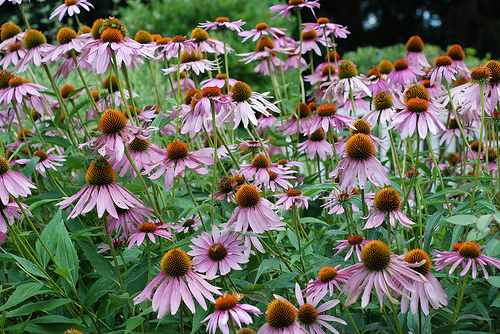Echinacea
Echinacea is an herbal remedy people often use to treat the common cold. Many people believe that the plant can boost the immune system and reduce the severity or length of colds. Echinacea is one of the best-selling herbal products in the U.S.
Echinacea stimulates the overall activity of the cells responsible for fighting all kinds of infection. Unlike antibiotics, which directly attack bacteria, echinacea makes our own immune cells more efficient at attacking bacteria, viruses and abnormal cells, including cancer cells. It increases the number and activity of immune system cells including anti-tumor cells, promotes T-cell activation, stimulates new tissue growth for wound healing and reduces inflammation in arthritis and inflammatory skin conditions.
Contents
Uses
- Common cold: Many scientific studies show that taking some echinacea products when cold symptoms are first noticed can modestly reduce symptoms of the common cold in adults. But other scientific studies show no benefit. The problem is that scientific studies have used different types of echinacea plants and different methods of preparation. Since the studies have not been consistent, it is not surprising that different studies show different results. If it helps for treating a cold, the benefit will likely be modest at best. It also isn’t clear whether echinacea can help PREVENT colds. Any benefit is likely to be modest.
- Vaginal yeast infections: Taking echinacea and applying a medicated cream to the skin seems to lower the recurrence rate of infection to about 16% compared to 60.5% with econazole alone.
Side Effects
- Echinacea is LIKELY SAFE for most people when used short-term. There is not enough information to know if echinacea is safe for long-term use. Some side effects have been reported such as fever, nausea, vomiting, unpleasant taste, stomach pain, diarrhea, sore throat, dry mouth, headache, numbness of the tongue, dizziness, insomnia, disorientation, and joint and muscle aches.
- Echinacea is POSSIBLY SAFE in children. It seems to be safe in most children ages 2-11 years. However, about 7% of these children may experience a rash that could be due to an allergic reaction. There is some concern that allergic reactions to echinacea could be more severe in some children. For this reason, some regulatory organizations have recommended against giving echinacea to children under 12 years of age.
- Echinacea is most likely to cause allergic reactions in children and adults who are allergic to ragweed, mums, marigolds, or daisies. If you have allergies, be sure to check with your healthcare provider before taking echinacea.
- Applying echinacea to the skin can cause redness, itchiness, or a rash.
Cautions
- Pregnancy or breast-feeding: Not enough is known about the use of echinacea during pregnancy and breast-feeding. Stay on the safe side and avoid use.
- Auto-immune disorders such as such as multiple sclerosis (MS), lupus (systemic lupus erythematosus, SLE), rheumatoid arthritis (RA), a skin disorder called pemphigus vulgaris, or others: Echinacea might have an effect on the immune system that could make these conditions worse. Don’t take echinacea if you have an auto-immune disorder.
- An inherited tendency toward allergies (atopy): People with this condition are more likely to develop an allergic reaction to echinacea. It’s best to avoid exposure to echinacea if you have this condition.
References
Source: WebMD, “Echinacea”, www.webmd.com/vitamins-supplements/

